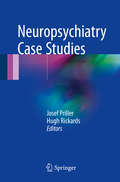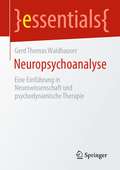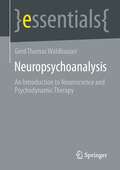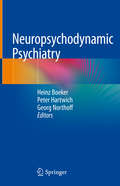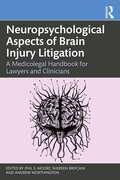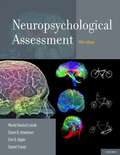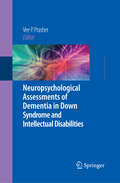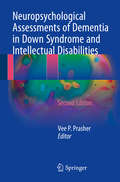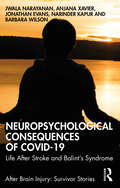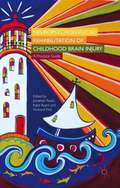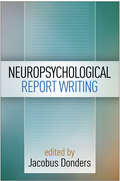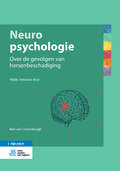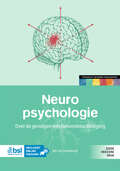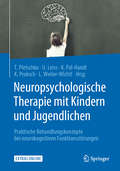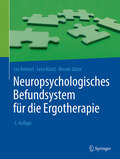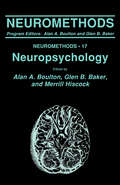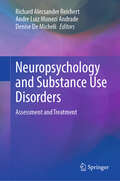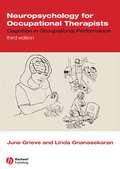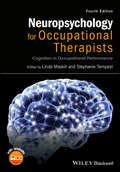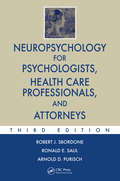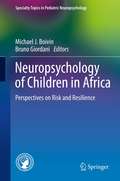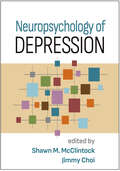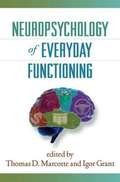- Table View
- List View
Neuropsychiatry Case Studies
by Josef Priller Hugh RickardsThis book comprises succinct, accessible clinical cases in neuropsychiatry. Each clinical case has a specific and practical learning point, concerned with assessment, diagnosis, treatment or general approach. Each case models clinical reasoning and shows how the 'puzzle' in the case changed the future practice of the author. Neuropsychiatry Case Studies is divided into sections relating to specific areas of neuropsychiatry, including dementias, movement disorders, autoimmune encephalopathies and epilepsy, amongst others. This book is aimed at trainee doctors in neurology and psychiatry and will also be of interest to fully trained doctors, nurses, psychologists and other allied health professionals working in this area.
Neuropsychoanalyse: Eine Einführung in Neurowissenschaft und psychodynamische Therapie (essentials)
by Gerd Thomas WaldhauserNeurowissenschaft und Psychoanalyse erscheinen zunächst als zwei grundsätzlich verschiedene, unvereinbare Zugänge zum menschlichen Erleben und Verhalten. Allerdings gab es schon seit Beginn der Entwicklung der Psychoanalyse immer wieder Bestrebungen, psychoanalytische Konzepte und Prozesse neurowissenschaftlich zu begründen. Auf der anderen Seite liefert die Psychoanalyse ein umfassendes Modell der menschlichen Psyche in all ihrer Komplexität und Dynamik, welches helfen könnte, die vielfältigen und häufig sehr spezialisierten Ergebnisse der modernen Hirnforschung in ihrer Gesamtheit zu verstehen. Das vorliegende Buch fasst den momentanen Stand der Forschung in diesem Schnittbereich zwischen Tiefenpsychologie und Hirnforschung zusammen und arbeitet heraus, wie sowohl Praktiker als auch Grundlagenforscher von einem fruchtbaren Austausch zwischen den beiden Disziplinen profitieren können.
Neuropsychoanalysis: An Introduction to Neuroscience and Psychodynamic Therapy (essentials)
by Gerd Thomas WaldhauserNeuroscience and psychoanalysis initially appear as two fundamentally different, incompatible approaches to human experience and behavior. However, from the very beginning of the development of psychoanalysis, there have been repeated efforts to ground psychoanalytic concepts and processes in neuroscience. On the other hand, psychoanalysis provides a comprehensive model of the human psyche in all its complexity and dynamics, which could help to understand the diverse and often highly specialized findings of modern brain research in their entirety. This book summarizes the current state of research in this area of intersection between depth psychology and brain research and elaborates how both practitioners and basic researchers can benefit from a fruitful exchange between the two disciplines.
Neuropsychodynamic Psychiatry
by Georg Northoff Peter Hartwich Heinz BoekerThis book presents a comprehensive neuropsychodynamic strategy for treating psychiatric disorders. Rather than pursuing an exclusively biological, psychological, or psychodynamic approach, it offers a methodology that links all three aspects in a unifying, integrative model. Central to this approach is the view of the brain as a bio-psychosocial organ in a neuro-ecological model, rather than the purely neuronal model often presupposed in current neuroscience and psychiatry. Moreover, the book views psychopathological symptoms as spatiotemporal disorders of the altered spatiotemporal structure spanning the brain and its surrounding world. The relation between one of the core symptoms and altered neuronal activity calls for the development of integrated, circular neuropsychodynamic models of psychopathological symptoms in severe psychiatric disorders and their treatment.
Neuropsychological Aspects of Brain Injury Litigation: A Medicolegal Handbook for Lawyers and Clinicians
by Phil S. MooreThis accessible handbook focuses on the importance of neuropsychological evidence and the role of the neuropsychologist as expert witness in brain injury litigation. This thorough, evidence-based resource fosters discussion between the legal profession and expert neuropsychological witnesses. The chapters reflect collaborations between leading personal injury lawyers and neuropsychologists in the UK. Key issues in brain injury litigation are addressed that are essential to an understanding of the role of the neuropsychologist as expert witness and of neuropsychological evidence for the courts. These include neuropsychological testing, assessment of quantum, vocational rehabilitation, mental capacity, forensic outcomes, the frontal paradox, mild traumatic brain injury and more. Combining the scientific and legal background with practical tips and case examples, this book is valuable reading for legal professionals, particularly those working in personal injury and clinical negligence, as well as trainees, students and clinicians in the field of neuropsychology, neurorehabilitation and clinical psychology.
Neuropsychological Assessment , Fifth Edition
by Muriel Deutsch Lezak Diane B. Howieson Erin D. Bigler Daniel TranelNow in its Fifth Edition, Neuropsychological Assessment reviews the major neurobehavioral disorders associated with brain dysfunction and injury. This is the 35th anniversary of the landmark first edition. As with previous editions, this edition provides a comprehensive coverage of the field of adult clinical neuropsychology in a single source. By virtue of the authors' clinical and research specializations, this book provides a broad-based and in-depth coverage of current neuroscience research and clinical neuropsychology practice. While the new edition is updated to include new features and topics, it remains true to the highly-regarded previous editions. Methods for obtaining optimum data are given in the form of hypothesis-testing techniques, clinical tips, and clinical examples. In the seven years since the previous edition, many advancements have been made in techniques for examining brain function and in our knowledge about brain-behavior relationships. For example, a surge of functional imaging data has emerged and new structural imaging techniques have provided exquisite detail about brain structure. For the first time, this edition includes examples of these advancements, many in stunning color. This edition also includes new tools for clinicians such as a neuroimaging primer and a comparison table of the neuropsychological features of progressive dementias. The chapters on assessment procedures include discussion of issues related to test selection and reviews of recently published as well as older test batteries used in general neuropsychological assessment, plus newly developed batteries for specific issues.
Neuropsychological Assessments of Dementia in Down Syndrome and Intellectual Disabilities
by Vee P. PrasherThis book reviews important neuropsychological measures currently used in the assessment of dementia by the principal clinicians and researchers associated with the test, offering practical guidance on each test along with an analysis of its limitations.
Neuropsychological Assessments of Dementia in Down Syndrome and Intellectual Disabilities
by Vee P. PrasherUp to the early 1980s neuropsychological assessments of persons with intellectual disability (ID) usually meant an assessment for developmental delay, of intelligence (intelligence quotient testing) or of level of adaptive behavior. Popular tests included the Stanford-Binet, Wechsler Intelligence Scales, Bayley Scales of Infant Development, the Griffin Mental Developmental Scales, and the Vineland Social Maturity Scale. These were assessments of the "overall" level of ability. Arthur Dalton in New York was one of a few pioneering clinicians who at this time, focused on the development of tests for specific areas of cognition in persons with ID. Following his work, sub- quent researchers, in the latter part of the twentieth century, have proposed and dev- oped a number of measures not only to detect the level of cognitive abilities but also to measure decline; a perquisite to the diagnosis of dementia. At the beginning of the twenty-first century as demonstrated in this book, several neuropsychological measures have been developed to aid the clinical diagnosis of dementia/dementia in Alzheimer's disease (AD). Neuropsychological assessments no longer remain the sole responsibility of psychologists, as psychiatrists, resear- ers, ID nurses, neuroscientists, all now play a part in the development and adm- istration of specific tests.
Neuropsychological Consequences of COVID-19: Life After Stroke and Balint's Syndrome (ISSN)
by Barbara Wilson Jonathan Evans Narinder Kapur Jwala Narayanan Anjana XavierNeuropsychological Consequences of COVID-19 focuses on Anjana’s journey as a COVID survivor following a brain injury that left her with a very rare neuropsychological syndrome called Balint’s syndrome, a disorder associated with difficulties in visual and spatial coordination. It is also the first book of its kind to provide a first-hand account from India on surviving brain injury, from diagnosis, recovery and rehabilitation, providing the therapeutic milieu in the Indian context and exploring cultural influences on rehabilitation.Written jointly by Anjana, her neuropsychologist and the international experts in the field of neuropsychology who were also involved in her diagnosis and care, the book highlights how COVID-19, a virus primarily affecting the respiratory system, can also result in a disabling brain injury. It describes Anjana’s recovery and the rehabilitation she received and provides a deeper understanding of this experience of a very rare condition through the views of Anjana herself. In addition, Anjana’s rehabilitation journey stumbles upon many important themes of rehabilitation including cultural sensitivity, personal identity, resilience, role of family and rehabilitation in a low to middle income country.This book is valuable reading for clinical and neuropsychologists, neurologists, other rehabilitation therapists including physiotherapists, occupational therapists, nurses and social work professionals, particularly those interested in cross cultural rehabilitation. It will also be of interest to students in these fields.
Neuropsychological Neurology
by A. J. LarnerEssential to the management of patients suffering from neurological disorders is an understanding of the cognitive aspects of these conditions. This book begins with an outline of the various cognitive domains and how they can be tested, before covering in depth the cognitive deficits seen not only in prototypical neurodegenerative cognitive disorders (Alzheimer's disease, frontotemporal dementias, Huntington's disease, prionoses), but also in other common neurological disorders which may be complicated by cognitive impairment (stroke, multiple sclerosis, Parkinson's disease, brain tumours). This book is an essential reference text for all neurologists, not just those with an interest in cognitive disorders; and for general physicians and specialists who deal with any endocrine, metabolic, vascular, or infective disorders which may compromise cognitive function. Practitioners of professions allied to medicine which involve contact with cognitively impaired patients will also find this text useful.
Neuropsychological Rehabilitation
by Barbara A. Wilson Fergus Gracey Jonathan J. Evans Andrew BatemanAfter an introduction to the current theories and research findings related to brain injury rehabilitation, this text presents 20 case studies of adults who sustained severe brain damage caused by traumatic head injuries, encephalitis, stroke, hypoxia and other conditions. Problems that follow such injuries are analyzed in detail; these include loss of self-care skills, memory impairment, and language, reading, visuoperceptual and behavioral difficulties. The chapters describe the lifestyle of each individual before the onset of brain damage and the subsequent symptoms, neuropsychological assessment, rehabilitation, and long-term outcome of their condition. Most chapters include a report by the patient and/or family member, thus enhancing the reader's understanding of the predicaments faced by brain-injured individuals as they learn to cope with traumatic changes in lifestyle. Although improvement for those with severe brain injuries is slow and limited, the patients described in the book made some progress after their admission to rehabilitation services. The exhaustive analysis of each case and a step-by-step description of management will serve as an inspiring and informative guide for students, professionals and other caregivers.
Neuropsychological Rehabilitation of Childhood Brain Injury
by Jonathan Reed Katie Byard Howard FineIncreasing numbers of children and young people are surviving road traffic accidents and birth complications but are being left with neurological disability. Although a brain injury can be a potentially devastating childhood medical condition Neuropsychological rehabilitation of childhood brain injury explores the developing field of neuropsychology to aid rehabilitation. The book brings together contributions from leading international clinicians and researchers to describe not only what we understand about childhood brain injury but also what has been demonstrated to help and possible innovative directions that can be taken in the future. By including a comprehensive review of the neuropsychological consequences of child brain injury alongside solid research outcomes this book provides an authoritative guide on how to help children with brain injury using neuropsychology.
Neuropsychological Report Writing (Evidence-Based Practice in Neuropsychology)
by Jacobus DondersAll neuropsychologists need to know how to produce evidence-based reports. This book brings together experts to provide an in-depth guide to high-quality report writing in a range of contexts, including evaluations of older adults, psychiatric patients, those with complex medical conditions, schoolchildren, and others. It reviews the fundamental elements of a clinical neuropsychological report and shows how to tailor findings, conclusions, and recommendations to particular audiences, such as referring physicians, school professionals, and legal decision makers. Of special utility, every chapter features excerpts of sample reports, including examples of strong and poor documentation of the same material.
Neuropsychologie: Over de gevolgen van hersenbeschadiging
by Ben Van CranenburghDit boek helpt professionals (in opleiding) om hersenaandoeningen beter te begrijpen. Het bespreekt systematisch welke stoornissen en problemen kunnen ontstaan door hersenbeschadiging, ontwikkelingsstoornissen en degeneratieve aandoeningen. De problemen die de patiënt in zijn dagelijks leven ervaart, zijn daarbij steeds de leidraad. Het boek is met name bedoeld voor therapeuten, artsen, psychologen, verpleegkundigen en studenten. Neuropsychologie, Over de gevolgen van hersenaandoeningen maakt deel uit van de een zesdelige serie ‘Toegepaste neurowetenschappen’. Het boek is gebaseerd op jarenlang onderzoek en talrijke patiëntencasussen. Het boek gaat in op wetenschappelijke ontwikkelingen in de klinische neuropsychologie én beschrijft vragen en situaties uit de praktijk. De eerste hoofdstukken bespreken de uiteenlopende oorzaken en gevolgen van hersenaandoeningen. Vervolgens wordt elke stoornis, zoals afasie en apraxie, uitgewerkt. Ook krijgt u handvatten om in de praktijk een neuropsychologisch onderzoek te doen en krijgt u oefeningen aan de hand van casuïstiek. De volgende hoofdstukken gaan in op neuropsychologische aspecten van ontwikkelingsstoornissen, veroudering en degeneratieve ziekten. Ten slotte ziet u zeven praktijkdiagrammen met uitgewerkte voorbeelden die u direct in de klinische praktijk kan gebruiken. Bij het boek hoort ook een online omgeving met vragen en antwoorden, samenvattingen en verwijzingen naar casuïstiek en video’s.Neurowetenschapper Ben van Cranenburgh studeerde geneeskunde in Amsterdam en was als wetenschappelijk medewerker verbonden aan onder meer het Nederlands Centraal Instituut voor Hersenonderzoek en het Revalidatie Centrum Amsterdam. In 1987 richtte hij het Instituut voor toegepaste neurowetenschappen (ITON) op, waarvan hij tot op heden directeur is. De stichting ITON biedt nascholingscursussen aan op het gebied van de toegepaste Neurowetenschappen.
Neuropsychologie: Over de gevolgen van hersenbeschadiging
by Ben van CranenburghDit boek biedt inzicht in hersenaandoeningen en de gevolgen ervan voor cognitie, mentale processen en gedrag. Het richt zich op neuropsychologische functiestoornissen door hersenbeschadiging, ontwikkelingsstoornissen en neurodegeneratieve aandoeningen. De nadruk ligt op de gevolgen die patiënten in hun dagelijks leven ervaren. Het boek is bedoeld voor studenten, therapeuten, artsen, psychologen en verpleegkundigen. De eerste hoofdstukken geven een overzicht over de uiteenlopende oorzaken en gevolgen van hersenaandoeningen. Daarna volgt een gedetailleerde uitleg over stoornissen als afasie, apraxie, agnosie, amnesie en neglect, met casuïstiek-oefeningen. In aparte hoofdstukken worden neuropsychologische aspecten van ontwikkelingsstoornissen en neurodegeneratieve ziekten behandeld. Bij dit boek hoort een online platform met extra bijlagen, vragen, samenvattingen, casuïstiek en video’s, plus zeven praktijkdiagrammen voor direct gebruik in de klinische praktijk. Het boek is onderdeel van de zesdelige serie ‘Toegepaste neurowetenschappen’ en is gebaseerd op jarenlange studie en ervaring van de auteur.
Neuropsychologische Therapie mit Kindern und Jugendlichen: Praktische Behandlungskonzepte bei neurokognitiven Funktionsstörungen
by Thomas Pletschko Ulrike Leiss Katharina Pal-Handl Karoline Proksch Liesa J. Weiler-WichtlDas Buch stellt neuropsychologische Interventionen aus der Kinder-und Entwicklungsneuropsychologie vor, die maßgeschneidert auf Kinder mit neurokognitiven Funktionsstörungen angewendet werden können – im klinischen wie im ambulanten Kontext. Sie werden mit ihren Einsatzgebieten anschaulich und konkret vorgestellt anhand zahlreicher Fallbeispiele. Dem Leser wird ein konkretes evidenzbasiertes Behandlungskonzept spezifisch für Kinder und Jugendliche präsentiert, in dem verschiedene Methoden zur Anwendung kommen können.
Neuropsychologisches Befundsystem für die Ergotherapie
by Lea Krönert Lena KünzlDieses Arbeitsbuch bietet eine praxisorientierte Anleitung zur Befunderhebung und Dokumentation von neuropsychologischen Störungen. Gemäß der ICF werden dabei vorrangig die Alltagsprobleme der Patient*innen auf Aktivitäts- und Partizipationsebene erfasst. Durch diese Herangehensweise gelingt es mit minimalem Aufwand, eine klare und zielgerichtete Sammlung von relevanten Informationen für die weitere Behandlungsplanung zu erstellen. Aus dem Inhalt: Einführung in die Befundaufnahme, Einschätzung von Störungsbildern und Zielsetzung, Befundung der häufigsten neuropsychologischen Störungsbilder wie Neglect, Gedächtnisstörungen, Störungen der Exekutivfunktionen und Apraxie, weitere Kapitel liefern Informationen zur differenzierten Erfassung von Einschränkungen der Sensorik, Kommunikation und des Umgangs mit Zahlen und Geld, Dokumentationsbögen und Arbeitsmaterialien, neu in der 5. Auflage: komplett überarbeitet, erneuert und neu strukturiert, mit zusätzlichen Assessments sowie einem Kapitel zur Pusher-Symptomatik.
Neuropsychology
by Alan A. Boulton Glen B. Baker Merrill HiscockIn order to understand how the human brain functions, one must first understand its structure and mechanics. This exciting collection of methods offers proven techniques for productive work in this fast-paced field. Contributors-all widely known for their mastery of the major methods described here-have been specially selected to share their knowledge in this volume.
Neuropsychology and Substance Use Disorders: Assessment and Treatment
by Denise De Micheli Richard Alecsander Reichert Andre Luiz Monezi AndradeThis book is a comprehensive guide for health professionals working with psychoactive drug use and dependence who want to learn the nuts and bolts of the neuropsychology of substance use disorders. It presents the basic foundations of neuropsychology, including a historical overview of studies and research, theoretical and conceptual bases, and practical applications to the area of psychoactive drug use and dependence. It also includes a comprehensive introduction to the history, theoretical models, diagnostic criteria and epidemiology of substance use disorders. With a special focus on practice and applied knowledge, the volume presents the main methods of neuropsychological assessment of substance use disorders and reviews the most important neuropsychological and psychotherapeutic interventions to treat substance use disorders. Additionally, whole sections of the book are dedicated to explaining the impacts of substance use on cognitive and executive functions and the relationship between substance use and mental disorders in adolescence. Finally, the book also includes brief introductions to the neurobiology of substance use disorders and to research methodologies for studying the neuroscience of psychoactive substance use. Neuropsychology and Substance Use Disorders: Assessment and Treatment will be an invaluable resource for health and care professionals from different areas, such as clinical psychology, psychiatry, nursing and social woacrk, who are looking for a friendly introduction to the neuropsychology of substance use disorders. It will also be a helpful tool for graduate and undergraduate psychology students interested in specializing in this field of knowledge and practice.
Neuropsychology for Occupational Therapists: Cognition in Occupational Performance
by June Grieve Linda MaskillThe third edition of this successful textbook is written primarily for undergraduate students of occupational therapy, and for practitioners working in the field of cognitive rehabilitation. Those in other health and related professions, who work in the field of brain injury, will gain an understanding of how cognition and its impairment can affect behaviour. The content of the second edition has been expanded and updated to reflect advances in neuropsychology, and to incorporate an evidence based consideration of occupational therapy practice. Written in a clear and user-friendly style, this book provides a basic guide to normal cognition. The impact of cognitive impairments upon everyday living is explored and guidance is given upon the planning and implementation of rehabilitation to optimise occupational performance.
Neuropsychology for Occupational Therapists: Cognition in Occupational Performance
by Linda Maskill Stephanie TempestNeuropsychology for Occupational Therapists is a bestselling, comprehensive guide to the assessment and rehabilitation of impaired cognitive function and brain damage. Divided into two parts, the first introduces the fundamental role cognition has in occupational performance, before moving on to examine the theoretical frameworks behind cognitive rehabilitation. The second part covers the key components of each cognitive function, including attention, visual perception, movement, memory, and executive functions, and the disorders associated with them. Revised throughout, this invaluable new edition includes: Updated theory and evidence base of neuropsychology Frameworks and guidelines for assessment and intervention in practice Updated content on attention, memory and executive functions A new chapter on cognitive function in later years, and working with people to maintain cognitive health. Written in a clear and engaging style by an experienced author team of academic occupational therapists, with contributions from expert practising clinicians, it is full of a range of learning features, including case studies, summaries, and reflective activities, as well as for the first time narratives of the lived experience of cognitive impairment. Neuropsychology for Occupational Therapists is essential reading for students, newly qualified practitioners, and all those who work within neuropsychology and cognitive rehabilitation.
Neuropsychology for Psychologists, Health Care Professionals, and Attorneys (Rob & Smith's Operative Surgery Series)
by Robert J. Sbordone Ronald E. Saul Arnold D. PurischExtensively revised and expanded, this third edition of Neuropsychology for Psychologists, Health Care Professionals, and Attorneys provides a clear, concise, and comprehensive discussion of neuropsychology, outlining its purpose, use, and historical development. It covers the anatomy of the brain, a wide variety of neurobehavioral disorders, compr
Neuropsychology of Children in Africa
by Bruno Giordani Michael J. BoivinIncreasingly, global humanitarian efforts are focusing on improving the lives of children. And among the developing world, the African nations are particularly affected by extreme weather conditions, devastating pandemics, and armed conflict. Neurocognitive science offers significant avenues toward bringing needed aid to the continent while creating a template for helping children worldwide. The studies in Neuropsychology of Children in Africa clearly illustrate how the brain develops and adjusts in the face of adversity. Contributors span assessment approaches and public health risk factors, and represent established topics and emerging lines of research, including biocultural constructs and genomic technologies. Together, these chapters argue for methodology that is culturally sensitive, scientifically rigorous, consistent, and sustainable. And although the focus is pediatric, the book takes a lifespan approach to prevention and intervention, modeling a universal framework for understanding neurocognitive development. Included in the coverage: Assessment of very young children in Africa in the context of HIV.Psychosocial aspects of malnutrition among African children.Assessment of neuropsychological outcomes in pediatric severe malaria.Neurodisability screening using the Ten Questions questionnaire.The neuropsychology of sickle cell disease in West African children.Computerized Cognitive Rehabilitation Therapy for African children. As a guide to current findings or a springboard for new studies, Neuropsychology of Children in Africa is a necessary reference for researchers, policymakers, and diverse professionals in global aid organizations, and across the discipline.
Neuropsychology of Depression
by Shawn M. McClintock and Jimmy ChoiTimely and authoritative, this unique volume focuses on neurocognitive aspects of depression and their implications for assessment, evaluation, clinical management, and research. Experts in the field explore the impact of depression on executive function, learning and memory, working memory, and other critical capacities, and present cutting-edge assessment tools and procedures. The neurocognitive effects of widely used antidepressant treatments are reviewed, from psychotropic medications and evidence-based psychotherapies to established and emerging neuromodulation technologies. Practical aspects of working with adults across the lifespan with depression are addressed, including ways to strengthen treatment engagement and adherence, and to incorporate cultural considerations.
Neuropsychology of Everyday Functioning
by Igor Grant Thomas MarcotteWhile neuropsychological testing can accurately detect cognitive deficits in persons with brain injury, the ability to reliably predict how these individuals will function in everyday life has remained elusive. This authoritative volume brings together well-known experts to present recent advances in the neuropsychological assessment of key real-world capacities the ability to live independently, work, manage medications, and drive a car. For each of these domains, contributors describe cutting-edge tests, procedures, and interpretive strategies and examine salient theoretical and methodological issues. Chapters also review approaches for evaluating specific populations, including older adults and patients with traumatic brain injury, depression, dementia, schizophrenia, and other neurological and psychiatric disorders.
